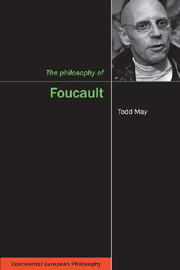Book contents
- Frontmatter
- Contents
- Abbreviations
- Acknowledgements
- 1 Introduction: who are we?
- 2 Archaeological histories of who we are
- 3 Genealogical histories of who we are
- 4 Who we are and who we might be
- 5 Coda: Foucault's own straying afield
- 6 Are we still who Foucault says we are?
- Notes
- Further reading
- References
- Index
3 - Genealogical histories of who we are
- Frontmatter
- Contents
- Abbreviations
- Acknowledgements
- 1 Introduction: who are we?
- 2 Archaeological histories of who we are
- 3 Genealogical histories of who we are
- 4 Who we are and who we might be
- 5 Coda: Foucault's own straying afield
- 6 Are we still who Foucault says we are?
- Notes
- Further reading
- References
- Index
Summary
In May and June of 1968, events in Paris and elsewhere – events that have both discursive and non-discursive aspects – alter the character of French life. They also alter the character of French thought. To recount these events in anything like the complexity they deserve is beyond the scope of this book. Moreover, any approach to the “events of May” or “May '68” invites controversy. No period in French history since the Second World War has generated as much discussion as these two months in the late 1960s. Are the events revolutionary, or are they just the indulgence of middle-class students? Have they had a long-lasting impact on French culture or politics, or are their effects localized to a time and place? Do they contribute to the rise of an independent French approach to the world, or simply stall its economic development? Are the events primarily a cultural phenomenon, or do they rise (or descend) to the level of politics? One cannot interpret the events without becoming, implicitly or explicitly, committed on these and other questions.
Let us be brief. In May 1968 students at the university at Nanterre go on strike to protest their administration's temporary closing of the university in the wake of demands for “anti-imperialist” study. These strikes are soon followed by workers' strikes, and intersection of these strikes brings together, at least temporarily, two sections of the French population that are traditionally separate from each other.
- Type
- Chapter
- Information
- The Philosophy of Foucault , pp. 61 - 95Publisher: Acumen PublishingPrint publication year: 2006



